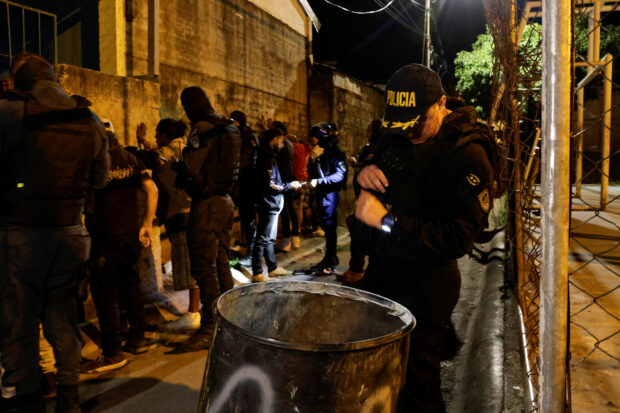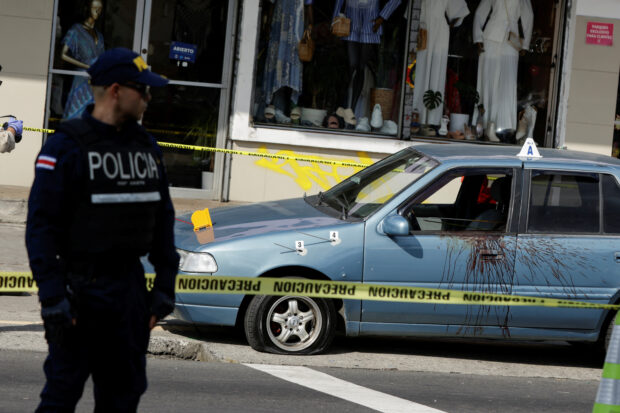Costa Rica eyes Salvadoran-inspired response to crime surge

A police officer inspects a garbage barrel as other officers frisk men for drugs and weapons during the “Costa Rica Segura Plus” operation, carried out in tough neighborhoods by security forces, in San Jose, Costa Rica, December 8, 2023. REUTERS/Mayela Lopez/File Photo
SAN JOSE/MEXICO CITY — Long a byword for laidback environmental tourism, Costa Rica is now wrestling with a surge in violence so striking that its government is borrowing a page from nearby El Salvador, which took draconian steps to tackle its crime problems.
To cut a homicide rate that has soared 40 percent in the last year alone, Costa Rican President Rodrigo Chaves has introduced tough new legislation to combat crime, dubbing El Salvador a “reference” point.
“Chaves is planning a crackdown… He’s a security hardliner pushing for a course correction,” said Chris Dalby, director of the World of Crime think tank. “‘Mano dura’ (firm hand) talk plays well.”
Chaves’ ideas include increasing jail sentences for minors to the adult maximum of 50 years, allowing extraditions, and extending the use of preventive detention, making it easier to hold suspects with limited evidence.
“Extraordinary times require extraordinary measures,” Chaves said as he presented his National Security Plan in November.
Article continues after this advertisementCosta Rica is one of a growing number of Latin American countries seeking to tackle the expansion of drug cartel activity by emulating Salvadoran President Nayib Bukele’s sweeping crackdown.
Article continues after this advertisementBukele’s suspension of constitutional rights, which among other things allows police to indefinitely detain suspected gang members without the right to a lawyer, has elicited strong condemnation by human rights campaigners.
But it has had a significant impact on crime and is domestically popular, putting Bukele on the verge of a historic reelection next month. And it has become a beacon for regional politicians battling gangs, from Chile to Ecuador.
While Chaves insists he doesn’t want to become exactly like Bukele, his plan is still a radical shift for Costa Rica, which has traditionally taken a gentler approach to crime prevention.
READ: Costa Rica launches probe into report government talked with gangs
Many in the opposition-controlled Congress publicly still cleave to that approach, but even there, whispers of support for tougher policies are growing, fueled by fears for the country’s $2 billion tourism sector.
“(Bukele’s) work dismantling organized crime has been excellent and worth analyzing to replicate in Costa Rica,” David Segura, a lawmaker in the opposition conservative New Republic party said in a recent social media post.
Costa Rica saw its murder rate jump to 17.2 per 100,000 people in 2023 from 11.7 in 2018. By contrast in El Salvador, the rate plunged to 2.4 after being the highest in the world less than a decade earlier.
Bukele was voted Costa Ricans’ favorite political leader in an October survey by research firm Indice. Meanwhile, Chaves’ own poll ratings have plummeted nearly 30 percentage points since his election in May 2022.
Changing winds
Analysts said Costa Rica’s spike in homicides has been driven by gang warfare among cocaine traffickers. Gang recruitment was helped by growing social discontent and unemployment during the COVID-19 pandemic.
Political friction with neighboring Nicaragua and Honduras has also hindered regional security cooperation, which analysts say has fed a sharp drop in cocaine seizures in Costa Rica.

A police officer guards a scene where unknown assailants opened fire and injured two persons traveling in a car, in San Jose, Costa Rica, January 10, 2024. REUTERS/Mayela Lopez/File Photo
Costa Rica’s traditionally light-touch handling of suspects – who are often simply given precautions in lieu of arrest – has also fueled the problem, according to Jorge Torres, Chaves’ security chief.
“How can a strong 17-year-old boy who killed a citizen with an AK-47 be treated like an 8-year-old boy who stole some candy?,” Chaves said in October, arguing criminal groups recruit minors precisely because they often get off scot-free.
For now, Chaves’ “mano dura” bill is stuck in Congress, with opposition critics calling it anti-Costa Rican and authoritarian.
“We live in a democracy. We’re not El Salvador or any of those countries that violate individual rights,” said Gloria Navas, a New Republic lawmaker who heads the congressional committee on Security and Drug Trafficking.
READ: Costa Rica’s homicide rate rises in deadliest year ever
Chaves needs the backing of at least 29 of 57 lawmakers for most of the proposals, and his party currently has only nine seats. But he has been able to previously pass legislation with support from other conservative factions.
Chaves’ other challenge is that Costa Rica is less used to pursuing narcos than its neighbors, having abolished its army over 70 years ago to prioritize progressive welfare policies.
Proponents of the welfare-first approach say historically that helped to shield Costa Rica from violence long prevalent in much of Central America, and that more welfare spending could do so again.
Laura Chinchilla, president from 2010 to 2014, said she had successfully curbed violence by preventing the poor from falling into crime.
“I don’t think we have to resort to the militarized models of other countries,” she told Reuters. “If we’ve done it (the peaceful way) for a lifetime, we should be able to do it now.”
Others in Congress think Chaves’ plan doesn’t go far enough.
Opposition conservative lawmaker Lesley Bojorges recently backed the idea of harsh El Salvador-style prisons, while judicial chief Randall Zuñiga has expounded the merits of more detentions.
Sergio Araya, a political scientist at the Konrad Adenauer Foundation, a conservative think tank, said such tougher approaches were on track to become more popular with Costa Ricans weary of crime in the coming months and years.
“There’s likely to be growing support for ideas in the so-called ‘Bukele model’,” he said.